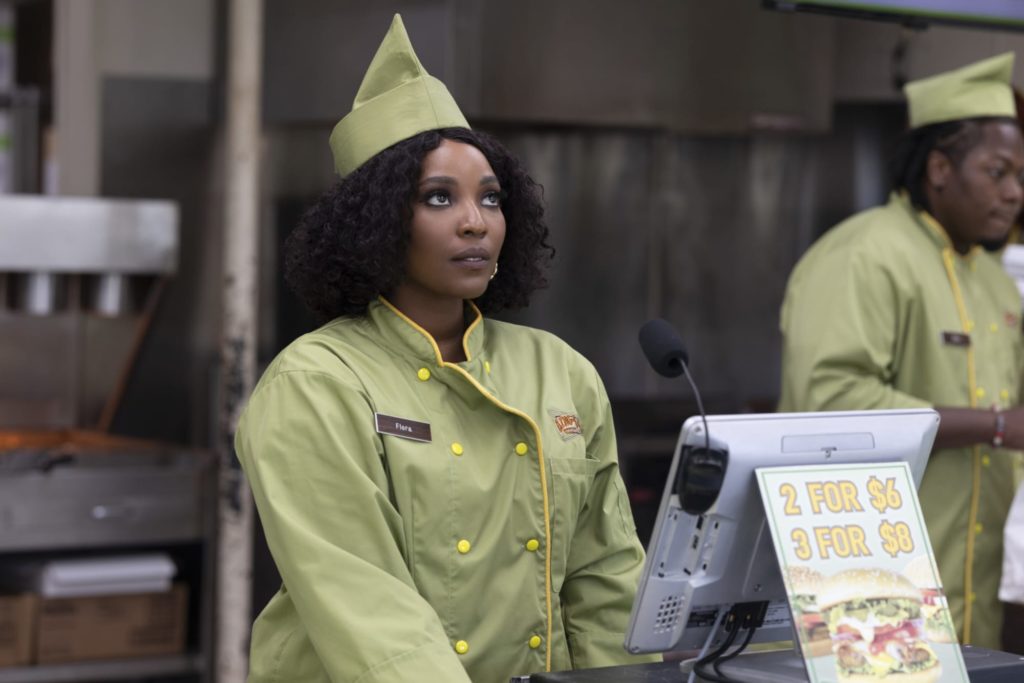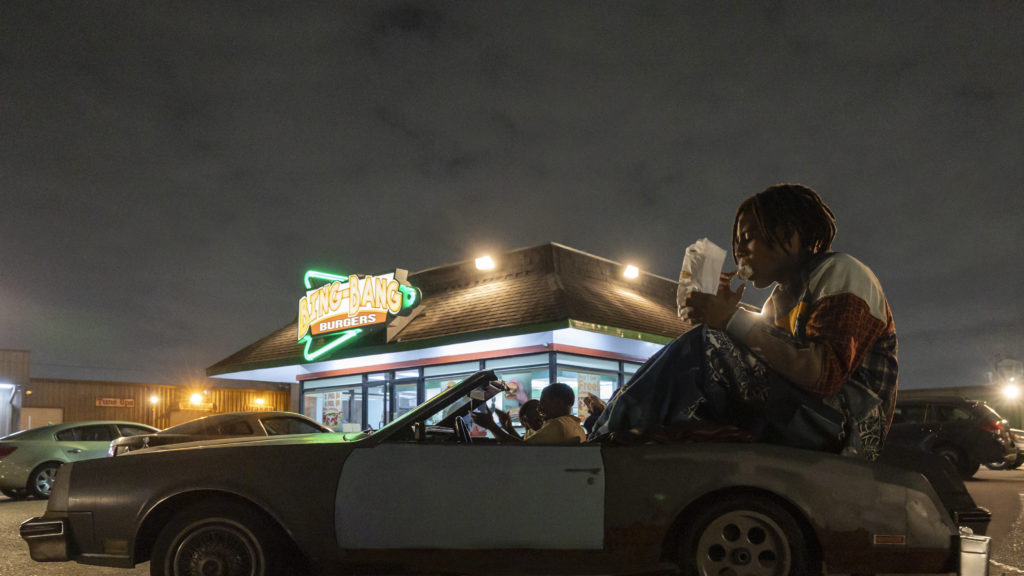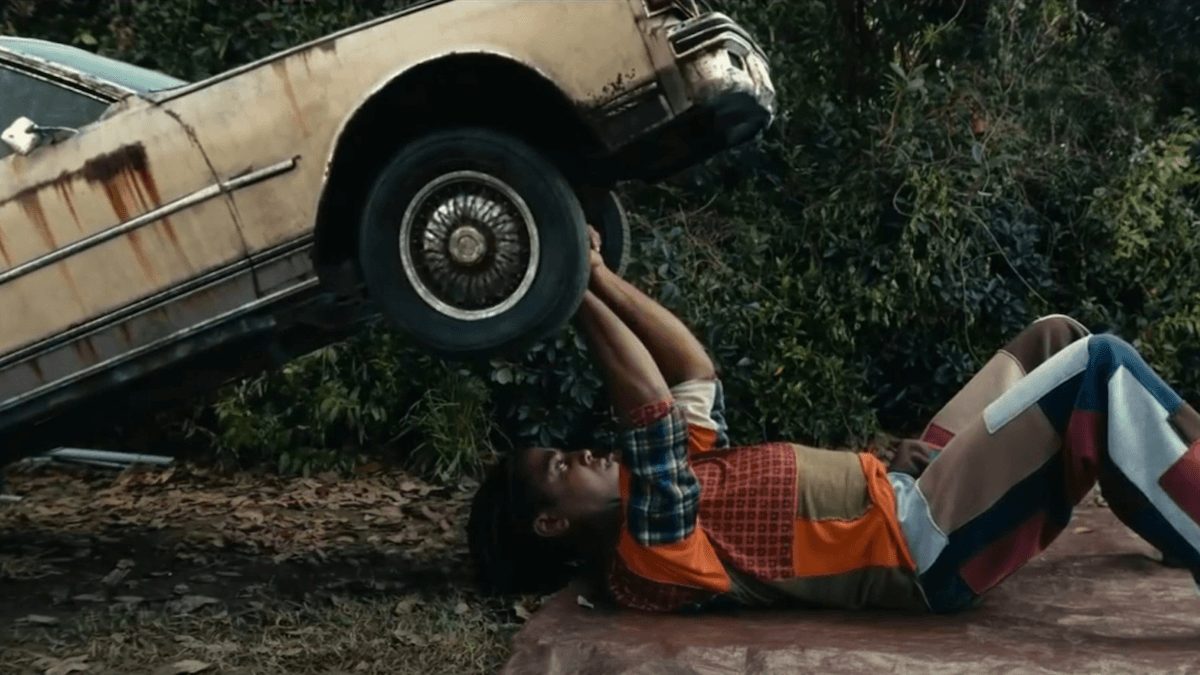I’m a Virgo is an unreal coming-of-age tale about a 13-foot tall, Black, 19-year-old, who’s spent his entire life secluded from the outside world…but not for long. Against the strict rules laid down by his adoptive parents, played by Mike Epps and Carmen Ejogo, our protagonist, Cootie, leaves the safety of his tucked away back yard and ventures out into his Oakland neighborhood. The story is both comedy and surreal with touches of fantasy and Afrofuturism. Over seven episodes, director Boots Riley (Sorry to Bother You) stretches the limits of our imagination in what feels like a psychedelic-induced block party in our hood with Riley acting as the DJ mixing beats that hit on individual identity, capitalism, and systemic racism.
When we first meet Cootie, we instantly know this isn’t going to be a normal story. Infant Cootie is the size of a St. Bernard in his mom, LaFrancine’s, played with a nurturing, but stern hand by Ejogo Carmen. LaFrancine and her partner, Martisse, do their best to hide Cootie as he grows, literally, beyond the walls and ceilings of their family home. Mike Epps shines in the role giving familiar big unc’ energy. For those trying to get into the surreal nature of Riley’s work, Ejogo and Epps’ performances here, help keep the story grounded. They both, for better or worse, try to instill a healthy fear in Cootie by teaching him the history of the giants that came before him – their short lives as side-show attractions and their ultimate demise at the hands of angry mobs when the giant’s novelty wore off. But like any kid in his own story, the call of the world beyond home is too tempting to ignore. So when Cootie is accidentally discovered by a group of local friends – Felix (Brett Gray), Jones (Kara Young) and Scat (Allius Barnes) who welcome him into their crew, his parents’ warnings aren’t enough to keep him from the call.
Watching Jharrel Jerome (When They See Us, Moonlight) lumber around as 13-foot Cootie is comical at first. Being cooped up in a home too small to allow him to stretch his legs, literally and figuratively, leaves Cootie with a persistent slump in his shoulders and an uncertainty in his interactions with others. Jerome is adept at fleshing out the vulnerability of the characters he inhabits and makes the audience feel what he’s feeling. We know Cootie is intelligent. His parents ensure that he’s well educated and secure in who he is and how he sees himself. They always end their family time with the mantra, “heart, heads, hands, feet. As long as I push, there is no defeat.” He has a clear ethics provided by his strict reading regimen and his parents’ influence. But he quickly realizes that his beliefs mean very little without real world practice. When Cootie and his new friends are shooting the shit in his giant sized clubhouse, Cootie starts to understand his home-schooling is lacking real world application. Cootie overhears that Felix works at Auto Area and knowingly sings the popular jingle only for Felix, Jones, and Scat to return awkward stares. They laugh, we laugh, but Cootie doesn’t get the joke.

Cootie’s lack of socialization makes him timid and ignorant to social cues, giving Jerome a chance to flex his comedy timing. When Cootie is confronted by a neighborhood gang outside the local club, he’s unaware that he should be intimidated, leading to a few funny exchanges between the angry gang leader and a confused Cootie. The whole scene gets even more hilariously pathetic when the gang jumps Cootie, only to realize they’re little more than a bite-sized nuisance. Cooties is hopelessly awkward in his attempts to flirt with the fascinating cashier at the local burger joint, Flora, who has unexplained hyper-speed powers. We breathe a sigh of relief with Cootie when Flora’s not turned off, but rather, flattered by his goofiness. It’s unclear though how socially unaware Cootie really is throughout the series, however. On one hand, we fully accept his lack of social consciousness when Flora questions Cootie about his love for his favorite superhero, comic book writer turned billionaire vigilante, Hero. To a sheltered Cootie, Hero is a man of law and order who dishes out justice to criminals. His friends’ experience of Hero, however, is reminiscent of that SNL Batman sketch where the Black citizens of Gotham continuously complain to an indignant Bruce Wayne that Batman is a menace who needs to be stopped from beating up and terrorizing their neighborhoods. Then on the other hand, we side-eye Cootie when he takes a modeling gig for a fashion brand that he fully understands is portraying him as this scary Black giant terrorizing the tiny white models cowering below him. He does it anyway because, after all, he’s getting to the money.
It’s all harmless fun for Cootie and director Riley. As Cootie’s world expands, Riley’s sequences get more bizarre. During one of the crew’s clubhouse smoke sessions, Jones draws Cootie into a tale about the rules of sex and situationships as defined by “the universe and my spirit”. To the audience, the cutaway feels like a weed induced trip. It isn’t until the final act of the series, though, that we’re let in on Jones’s storytelling superpower, not unlike Riley’s mission in his own films. When Cootie first meets Flora, she’s moving at an imperceptible rate of speed, so it’s initially unclear if anyone besides Cootie notices her. As we spend more time with Flora, we begin to understand the toll it takes on her entire being to constantly slow herself down to an unbearable degree, simply to engage with everyone else. I imagine many Black girls will relate to Flora’s burden, having to physically and mentally slow themselves down to fit into a world that barely sees them. Later, Flora introduces Cootie to his first sexual experience in a wild scene that’s an erotic mashup of a Pedro Almodovar fantastical melodrama and a Hype Williams’ dark sweaty music video. It is memorable!

But as much fun as Cootie is having experiencing the many “firsts” we take for granted, he doesn’t remain untouched by the state of the community around him. Real-life tragedy touches Cootie and his crew in the most devastating way and all too quickly he must lay his childishness aside and choose who he really wants to be to himself, his loved-ones, and his community. As Cootie’s story comes to a climax, Riley drives the final episodes full force with a kidnapping by a hipster cult, a heist on the insidious power company, and finally, a confrontation with Hero, where it seems like this story was headed all along.
For the all-over-the-place narrative that it was, I think I understood what Boots Riley does with I’m A Virgo. This coming-of-age surreal comedy is Riley’s art as activism. As Hero condescends to his put upon staff, “All art is propaganda.” And underneath Riley’s heady spectacle, is a real message about the corrupt nature of capitalism and how it bleeds into every corner of life when you are poor, Black and trapped in underserved communities. Viewers who are into experimental allegories oozing social commentary underneath will enjoy analyzing it. Casual viewers will get a kick out of the physical comedy and the practical effects grounded in believable performances.
Watch I’m a Virgo on Amazon.








